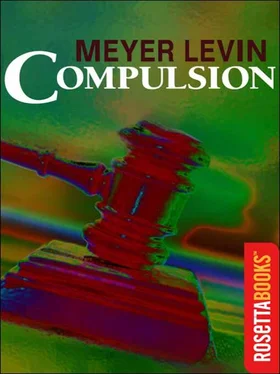And then, when the exaltation was gone, and I was walking tiredly home, I found myself thinking of all Willie had said. There was much in it that could have meaning, and the tool had been explained – how else could you explain it? – and I had forgotten, in the rush of all the new ideas he had conveyed, that other hint he had given me a few weeks ago. The place of burial.
On the following Monday, the trial was to begin. Scrawled letters threatened to blow up the court building if anything but a hanging verdict was the result. Editorials screamed at the waste of public funds to provide a trial for such monsters, yet gloated over our noble sense of justice that insisted on a defence opportunity, even for them. But there were also higher expectations of the trial. Some of us, perhaps imbued by Judd, expected lofty and timeless discussions, as at the trial of Socrates.
By eight o’clock the pavement of the County Building was lined for a solid block with citizens who hoped to glimpse the killers as they were brought from jail. A special cordon of police had been stationed in the building entrance, and a constant series of arguments was in progress, with irate citizens, with blandishing women, with people using every means of subterfuge to get through.
Upstairs, I found the hallway to the courtroom packed solid. The victors in the battle for coveted admission cards were mostly friends, wives, and daughters of politicians. And there were the special visitors – visiting jurists, celebrities, big lawyers passing through Chicago on their way to a vacation – all of whom wanted a glimpse of the trial of the century.
And finally, the press. Nearly half the courtroom was filled with correspondents from abroad, from national magazines, from out-of-town papers. But there existed a higher category still. The select of the press were in the jury box. Thus we saw ourselves as the true arbiters; what we wrote was judgment.
Several in the press box were old familiars, on the case from its beginning. Mike Prager was there, sporting his belligerent sneer; Richard Lyman, of the Tribune , had naturally appropriated the foreman’s seat; the Tribune had added a “fancy writer” named Arthur Kramer, who sat alongside the box, where extra chairs had been placed. A dozen sob sisters were in court to cover the women’s angle. Certainly Artie evoked a hysterical tenderness in women. We heard it now in the corridor, a curious feminine shrieking and gasping, as the boys were pulled through the crowd; we glimpsed bare arms, hands reaching toward him, heard a few piercing girls’ voices above the others – “Artie!” “Artie, honey!”
Inside, the two sides had assembled. For the prosecution, there was Horn, looking ruddy, massaged, made fit for battle, low-set, a line-driver. Padua was on his left, handsome, a smiling ball-carrier. They were accompanied by Czewicki – a padded interference man, with his mountains of files and reference books – and a half-dozen others.
The other team was older-looking: Wilk, in his studied shabbiness, his clothes having the same rough, worn, softened look as his face; Ferdinand Feldscher, perfectly groomed, reasonable, shrewd, smooth; his brother Edgar, with his high forehead, his unlit pipe, his slightly poetic look that made one wonder what he was doing in a law court, in a murder case.
Then there were the representatives of the families: Artie’s brother James, who aroused sympathy, and his Uncle Gerald, leaning forward to whisper to the lawyers. On Judd’s side, father and brother sat together; sometimes Max was to be absent, and Judah Steiner would sit alone, a monumental Job, a figure that seemed, even within the crowded courtroom, removed by some invisible wall.
Directly behind sat two small men, Charles Kessler and his brother Jonas, their faces impassive. Judge Wagner was with them.
And so the prisoners were led in. Artie exchanged a puckish smile with his brother and uncle, while Judd cast a furtive glance toward his kin.
Then came the judge, in his black robe. Throughout the sweltering August Chicago heat, he was to retain in his black robe that look of being unaffected by weather as by any mere extraneous factor.
The case was called, and a representative of each side rose to state what it would attempt to show. Horn in person declared for the State that never in all the world had so cold, vile, and excuseless a murder been committed, and that the extreme penalty was inescapable in such a case. When Ferdinand Feldscher rose for the defence, it was simply to state that their efforts would be to present evidence in mitigation.
Horn called his first witness, the Polish worker who had found the body.
And then, for more than two weeks, there ensued a dull parade of circumstantial witnesses, the undertaker, various policemen, handwriting experts, the diver who had found the typewriter – all in endless detail proving the crime which the defence fully conceded. But there was method to it, for by having witnesses describe the blood, the body, by having teachers describe the innocent schoolboy, and by piling up evidence of the luxury in which the murderers had been raised, Horn was indeed proving aggravation, to counterbalance any mitigating evidence the defence might offer.
During those weeks, the defence could only make effort after effort to shorten the proceedings; witnesses were rarely cross-examined, except for an occasional flash question to show the defence was in form.
Then came the coroner’s physician, Dr. Kruger. Despite an air of disgust and impatience on the part of Judge Matthewson, Horn kept the doctor on the stand, describing “signs of sexual abuse”.
The defence objected incessantly. The coroner’s verdict itself stated that no conclusion could be drawn. Surely the prosecutor was attempting deliberately to arouse prejudice!
Horn flared back. “Prejudice! Monsters are monsters!”
Finally, Wilk had the witness. This time there was no perfunctory dismissal. Had Dr. Kruger not stated that no tangible evidence existed? How then could he come to a conclusion? Oh, it was an opinion . Would there not be just as much basis for the opposite opinion? Then it was a guess ? Were medical men given to swearing on guesswork?
Dr. Kruger, with each reply, seemed ready to jump out of his seat. But Wilk kept him pinned there with a barrage of medical questions. Wasn’t it true that muscle tension relaxed after death? Particularly during all-night immersion? “Then the condition was really normal, wasn’t it?”
“That’s my opinion and I stick to it!” the coroner’s physician snapped. Wilk shrugged, and waved him from the stand.
The retinue of humdrum witnesses continued.
For Judd, the trial was the last bitter irony. Was this the great trial that was in a sense to have justified his crime by bringing momentous questions before mankind? The question of free will, the question of law and the superman, reduced to routine evidence about a fake signature on a hotel registry. And for Artie, there was no particular disappointment, only boredom; to him the outcome was interesting only as a kind of bet, a long shot on life.
Then came my day to testify.
I had assured myself that testifying on the stand would only be like sitting in front of the typewriter. When I wrote, I gave testimony, making it as true as I knew how. Then what was it that troubled me? Was it some feeling that I would nevertheless that day be deserting my function as an objective bystander, to take the chair and participate?
From Artie and Judd, I was sure I received a special, measuring look, weighing how damaging I might be.
I had gone over the material with Tom. Certain words of Artie’s would be ugly to repeat. But we had long ago put them into print; how could we change them? If you had to pick a kid to kill, he was just the kind of cocky little sonofabitch you’d choose . That sentence, we both knew, was counted on by Horn as a hanging sentence.
Читать дальше












